In Conversation with Author Lorna Fergusson
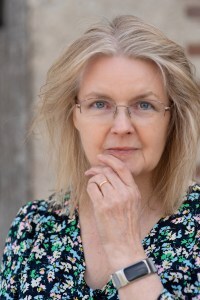 At the end of each month, I like to share a conversation with an author friend about our writing lives. For my first “In Conversation” post of 2025, I’m delighted to welcome Lorna Fergusson, author, editor, writing coach, speaker, and a wise and generous mentor.
At the end of each month, I like to share a conversation with an author friend about our writing lives. For my first “In Conversation” post of 2025, I’m delighted to welcome Lorna Fergusson, author, editor, writing coach, speaker, and a wise and generous mentor.
Although we live too far apart to meet frequently in real life, we have enjoyed writing retreats together and have occasionally been speakers at the same events.
Like me, Lorna is always busy juggling different book-related tasks in between writing her own work, so it’s always a cause for celebration when she publishes new fiction. Today, we’re talking particularly about One Morning in Provence, her new collection of short stories, set in France, and about creating a sense of place in fiction.
Debbie: Like your novel, The Chase, your new book, One Morning in Provence, is set in France. Your lyrical and original writings are filled with love for rural France. Why is this area so special to you – and so stimulating creatively?
Lorna: When I wrote The Chase, quite a number of years ago now, it was inspired by the Dordogne region of France. My husband and I had a half-share in a holiday home near Bergerac for some years and part of the novel was actually written there, celebrating my love for the culture, history and landscape.
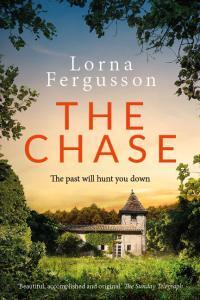 The highly acclaimed “The Chase” has recently been reissued with a gorgeous new cover
The highly acclaimed “The Chase” has recently been reissued with a gorgeous new coverWriting One Morning in Provence was a bit of a revelation because it came so easily to me, to tap into memories of other visits to France throughout my life. Each story in the collection is based in a particular location I’ve visited.
The book has reinforced what I’ve always known, that all my stories are anchored in place and the spirit of place. I find descriptive writing really fulfilling and if I feel I can transport a reader to the location I’m describing, that feels great!
It was extraordinary how intense my sensory memories, all the way back to girlhood, were. All I had to do was imagine new characters and how these places might affect them!
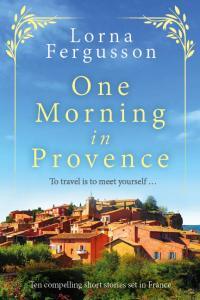 Lorna Fergusson’s collection of evocative short stories was published in December 2024.
Lorna Fergusson’s collection of evocative short stories was published in December 2024.Debbie: To what extent does the place become almost another character in your writing?
Lorna: I do think that our travels have a deep and abiding effect on us. It’s just the same as when you meet people – for some you feel an immediate antipathy, some are just ‘meh!’, and some become soulmates very quickly.
When we travel our senses are on high alert: we notice more, we feel more. And that, in these stories, can trigger unexpected feelings, decisions and transformations in the characters I bring to these settings. So they engage with setting the way they might engage with another human being – and they are certainly never impervious to it.
 This map shows the settings of the stories in “One Morning in Provence”
This map shows the settings of the stories in “One Morning in Provence”Debbie: Although your setting for these stories is France, the main characters are all English, transformed in some way by their visit to the country. The French characters are very minor. Why did you write almost exclusively about “the Englishman/woman abroad”?
Lorna: This connects with what I’ve just been saying: if the characters lived in these places all the time, they would be a little ‘dulled’ somehow, taking for granted the beauty and resonance of what’s around them.
I didn’t really plan it in a cold-blooded, rational way – it was an instinctive approach. At some point it dawned on me that story after story was from the stand-point of a visitor, someone transitory, someone who would take away with them the meaning of their visit, someone changed by it.
Debbie: What other places dear to you have inspired stories, past, present or planned for the future?
Lorna: I love the far west of Cornwall and have set some as-yet unpublished work there.
Debbie: Me too! I’m hoping that we’ll both be sharing those works before too long. And thank you so much for the support and encouragement you’ve given me so far in developing my Cornish novel.
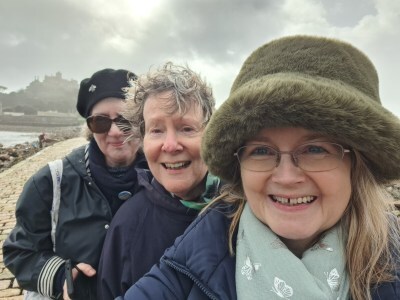 A souvenir of an inspiring writing retreat near St Michael’s Mount, Cornwall – I’m back left, thriller author Alison Morton is in the middle, and Lorna, who took the selfie, is on the far right
A souvenir of an inspiring writing retreat near St Michael’s Mount, Cornwall – I’m back left, thriller author Alison Morton is in the middle, and Lorna, who took the selfie, is on the far rightLorna: And there’s Oxford, of course, where I live and Scotland, where I come from.
The challenge when it comes to location is how to find a new spin if it is a place people already feel they know very well!
Debbie: That’s a very good point. As you know, my fiction is mostly set in the Cotswolds, a hugely popular region with writers and readers alike, where I’ve lived for over 30 years. I think you can’t beat real, lived experience for distinguishing your work in a well-known setting. First first-hand knowledge of a place will always trump research in making a story convincing and compelling, whether fiction or non-fiction, short or long.
Like me, you’ve always loved to write short stories as well as full-length fiction. What do short stories allow you to express that the novel doesn’t?
Lorna: Short stories are all about concentration. I’m delighted that this is a form experiencing something of a revival lately, because readers are challenged to find time to focus, and some don’t actually enjoy staying with an extended story over the long haul.
The thing about short stories for me is that they are a kind of ambush. You go in expecting something relatively light, brief, even trivial. But at their best, they’re none of these things.They offer the satisfaction of a tight construction, with an audible ‘click’ at the end as everything falls into place or twists into the unexpected.They also offer resonance – an effect that lasts long after you’ve read the last word.The characters may be on the page for a short time but they may stay in your mind for years.Finally, I think a good story gives you a sense of what is happening beyond its boundaries. It’s as if you know more about the people that you’ve been told, as if their lives go on in some way off the page.Debbie: That’s a compelling and eloquent justification for the anyone to start reading short fiction. Yet many novelists shy away from trying to write short stories as they find them too difficult. As a writing coach, what are three top pieces of guidance you’d offer to anyhone trying to write short stories?
Lorna: I think it is totally understandable that writers find short stories difficult to write. A novel is daunting in its own way, of course – all those words, all those pages. But it gives you time to stretch, even to indulge yourself with a big cast, detailed plots, sub-plots and so on.
By comparison a short story is a corset. It seems too tight and inhibiting. But for me, that is the challenge I love. It’s a Fabergé egg, in writing terms: jewelled, detailed, miniature.
I have always loved finding out where a story will take me, working with its inner beats and turns, finding that right ending.
That’s why writing One Morning in Provence was one of the most pleasurable writing experiences I’ve ever had.
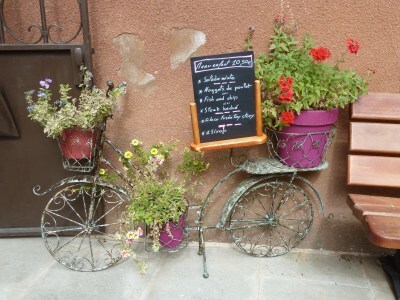
As for three top tips, well, here they are:
You don’t have time to faff around on the first page: get into the story, don’t get lost in back story or scene-setting. Get your reader into a situation and more than that, the psyche of the person who is in that situation, as soon as you can.Vary what you are doing: descriptive writing needs to justify its presence. Break long blocks up with judicious use of dialogue which is often the most economical way to give us an insight into character and interaction.Pace the story so that it breaks into natural phases: readers love to feel they are being taken by the hand and guided through, that the writer is in control and that a destination is coming which will be worth reaching. Think of how your last line or paragraph is going to resonate with them. Will they feel something? Shocked? Uplifted? Tearful? Any emotion is good – as long as they are not feeling cheated or let-down.One piece of advice you may well have come across is that a short story should have a single viewpoint. Rubbish. I have enjoyed playing with points of view in mine and if you carefully control what you are doing, you can introduce more than one. I have four in one of my One Morning in Provence stories!
 The perfect accompaniment for savouring Lorna’s stories set in Provence!
The perfect accompaniment for savouring Lorna’s stories set in Provence!Debbie: I’ve heard many avid readers say they dislike short stories, but when I press them, it often turns out they’ve hardly read any! I often recommend Ray Bradbury and Saki as an entry point to the joy of short fiction. Who would you suggest?
Lorna: Off the top of my head I’d say Margaret Atwood, Rose Tremain, Kate Atkinson and the American writer Ron Rash.
Debbie: What are you writing now? What are your writing/coaching/editing plans for 2025?
Lorna: Last year, I decided to recalibrate how I balance writing with my coaching and editing work, so I want to continue doing that in 2025. It has been a joy to rediscover my writing – and more importantly – my publishing mojo!
I hope to finish a book on mindset for writers that I have been working on for a few years, plus I am partway through a novel that was inspired by a short story which was runner-up for the Mogford Prize in 2021.I have more short story collections in mind, plus poetry collections.I’ll be spending most of my summer teaching on Oxford University’s creative writing summer schools.I have some novels to edit for clients, so it is shaping up to be a busy year.Debbie: Lorna, thank you so much for joining me in conversation today and sharing your insightful and thought-provoking comments. For anyone who hasn’t yet read One Morning in Provence, I highly recommend it as a warm, uplifting read for these dark wintry days (in the northern hemisphere where Lorna and I are, at least) – or as a great accompaniment on any holiday, to raise your awareness of how travel might affect you too.
FIND OUT MORE ABOUT LORNA FERGUSSON Lorna Fergusson is a writing coach, editor and speaker, author of The Chase and An Oxford Vengeance. She runs Fictionfire Literary Consultancy and has taught on various Oxford University writing programmes since 2002. Her stories have won an Ian St James Award, the Historical Novel Society’s Short Story Award, and been shortlisted for the Bridport Prize and Pan Macmillan’s Write Now prize. In 2021 and 2022 she was runner-up for the Mogford Prize. She is developing one of the Mogford stories as a novel, as well as working on poetry and a book on mindset for writers. Her latest book is One Morning in Provence, a collection of stories set in France.
Lorna Fergusson is a writing coach, editor and speaker, author of The Chase and An Oxford Vengeance. She runs Fictionfire Literary Consultancy and has taught on various Oxford University writing programmes since 2002. Her stories have won an Ian St James Award, the Historical Novel Society’s Short Story Award, and been shortlisted for the Bridport Prize and Pan Macmillan’s Write Now prize. In 2021 and 2022 she was runner-up for the Mogford Prize. She is developing one of the Mogford stories as a novel, as well as working on poetry and a book on mindset for writers. Her latest book is One Morning in Provence, a collection of stories set in France.
Connect with Lorna online:
Websites: www.lornafergusson.com & www.fictionfire.co.uk
Facebook: @LornaFergussonAuthor
Twitter: @LornaFergusson.
Buy her books:
One Morning in Provence ~ The Chase ~ An Oxford Vengeance



